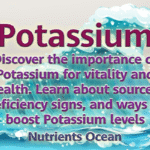Magnesium
In the realm of nutrition, some minerals take center stage for their pivotal role in maintaining our well-being. One such mineral, often overlooked yet crucial, is magnesium. While it might not always steal the spotlight, the importance of magnesium in supporting various bodily functions cannot be overstated.
Understanding Magnesium
Magnesium serves as a powerhouse within our bodies, participating in over 300 biochemical reactions. From energy metabolism to muscle and nerve function, this multitasking mineral plays a vital role in numerous physiological processes. Despite its significance, many individuals fall short of meeting their daily magnesium requirements, paving the way for potential health complications.
The Health Benefits of Magnesium
1. Heart Health:
Magnesium is essential for maintaining a healthy heart rhythm and supporting cardiovascular function. Adequate magnesium intake has been linked to a reduced risk of heart disease and stroke.
2. Bone Health:
Alongside calcium, magnesium contributes to bone density and strength. Incorporating magnesium-rich foods into your diet can help support bone health and reduce the risk of osteoporosis.
3. Muscle Function:
Magnesium plays a crucial role in muscle contraction and relaxation. Whether you’re an athlete or simply aiming for optimal muscle function, ensuring adequate magnesium intake is key.
4. Energy Production:
Magnesium is involved in converting food into energy, making it indispensable for overall vitality and metabolic processes.
5. Mood Regulation:
Magnesium is often referred to as nature’s tranquilizer, as it helps regulate neurotransmitters responsible for mood and stress management. Maintaining adequate magnesium levels may contribute to a more balanced mood and improved stress resilience.
Food Sources of Magnesium
Here are some food and natural sources of magnesium:
1. Leafy Greens:
Foods like spinach, kale, and Swiss chard are rich in magnesium. They are not only nutritious but also versatile in recipes like salads, smoothies, and stir-fries.
2. Nuts and Seeds:
Almonds, cashews, pumpkin seeds, and sunflower seeds are excellent sources of magnesium. They make for convenient and healthy snacks or additions to meals and baked goods.
3. Whole Grains:
Whole grains such as brown rice, quinoa, oats, and whole wheat contain magnesium. They provide essential nutrients and fiber, promoting overall health.
4. Legumes:
Beans, lentils, and peas are good sources of magnesium. They are affordable, versatile, and can be included in various dishes like soups, stews, salads, and dips.
5. Avocado:
Avocado is not only creamy and delicious but also a good source of magnesium. It can be enjoyed on its own, in salads, sandwiches, or as a topping for various dishes.
6. Fish:
Some fish, such as salmon, mackerel, and halibut, contain magnesium. Incorporating fish into your diet provides not only magnesium but also essential omega-3 fatty acids.
7. Dark Chocolate:
Dark chocolate with a high cocoa content is a tasty source of magnesium. Enjoying a small piece of dark chocolate can satisfy cravings while providing some health benefits.
8. Bananas:
Bananas are not only rich in potassium but also contain magnesium. They make for a convenient and portable snack or can be added to smoothies and oatmeal.
These sources provide various options to incorporate magnesium-rich foods into your diet, promoting overall health and well-being.
Signs and Symptoms of Magnesium Deficiency
Recognizing the signs of magnesium deficiency is crucial for maintaining optimal health. Some common symptoms include:
- Muscle cramps and spasms
- Fatigue and weakness
- Irregular heartbeat
- Nausea and vomiting
- Loss of appetite
- Numbness and tingling
- Mood disturbances, such as anxiety and depression
- Assessing Magnesium Deficiency
While blood tests can provide insights into magnesium levels, they may not always accurately reflect total body magnesium status. However, certain symptoms and risk factors can help identify potential deficiency:
1. Symptoms:
Pay attention to signs such as muscle cramps, fatigue, and mood disturbances, as they may indicate low magnesium levels.
2. Dietary Intake:
Evaluate your diet to assess whether you’re consuming magnesium-rich foods regularly. Common dietary sources include leafy greens, nuts and seeds, whole grains, and legumes.
3. Health Conditions:
Certain health conditions, such as gastrointestinal disorders and diabetes, can impair magnesium absorption and increase the risk of deficiency.
4. Medication Use:
Some medications, including diuretics and proton pump inhibitors, can deplete magnesium levels over time.
In conclusion, magnesium stands as a cornerstone of optimal health, influencing a myriad of bodily functions essential for vitality and well-being. By prioritizing magnesium-rich foods and being mindful of potential deficiency symptoms, you can harness the power of this mighty mineral to support your health journey. Remember, when it comes to magnesium, small changes can yield significant benefits, paving the way for a healthier and more vibrant life.




